Related Research Articles
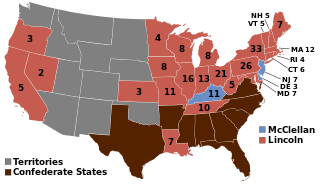
The 1864 United States presidential election was the 20th quadrennial presidential election. It was held on Tuesday, November 8, 1864. Near the end of the American Civil War, incumbent President Abraham Lincoln of the National Union Party easily defeated the Democratic nominee, former General George B. McClellan, by a wide margin of 212–21 in the electoral college, with 55% of the popular vote. For the election, the Republican Party and some Democrats created the National Union Party, especially to attract War Democrats.
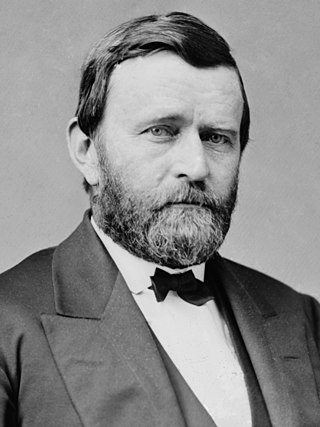
The 1868 United States presidential election was the 21st quadrennial presidential election, held on Tuesday, November 3, 1868. In the first election of the Reconstruction Era, Republican nominee Ulysses S. Grant defeated Horatio Seymour of the Democratic Party. It was the first presidential election to take place after the conclusion of the American Civil War and the abolition of slavery. It was the first election in which African Americans could vote in the reconstructed Southern states, in accordance with the First Reconstruction Act.

The Reconstruction era was a period in United States history following the American Civil War, dominated by the legal, social, and political challenges of abolishing slavery and reintegrating the former Confederate States of America into the United States. During this period, three amendments were added to the United States Constitution to grant equal civil rights to the newly freed slaves.
The Radical Republicans were a faction within the Republican Party originating from the party's founding in 1854—some six years before the Civil War—until the Compromise of 1877, which effectively ended Reconstruction. They called themselves "Radicals" because of their goal of immediate, complete, and permanent eradication of slavery in the United States. They were opposed during the war by the Moderate Republicans, and by the Democratic Party. Radicals led efforts after the war to establish civil rights for former slaves and fully implement emancipation. After unsuccessful measures in 1866 resulted in violence against former slaves in the rebel states, Radicals pushed the Fourteenth Amendment for statutory protections through Congress. They opposed allowing ex-Confederate officers to retake political power in the Southern U.S., and emphasized equality, civil rights and voting rights for the "freedmen", i.e., former slaves who had been freed during or after the Civil War by the Emancipation Proclamation and the Thirteenth Amendment.

Benjamin Franklin "Bluff" Wade was an American lawyer and politician who served as a United States Senator for Ohio from 1851 to 1869. He is known for his leading role among the Radical Republicans. Had the 1868 impeachment of U.S. President Andrew Johnson led to a conviction in the Senate, as president pro tempore of the U.S. Senate, Wade would have become acting president for the remaining nine months of Johnson's term.
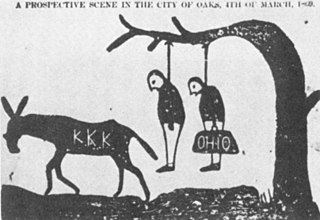
In United States history, the pejorative scalawag referred to white Southerners who supported Reconstruction policies and efforts after the conclusion of the American Civil War.

The Stalwarts were a faction of the Republican Party that existed briefly in the United States during and after Reconstruction and the Gilded Age during the 1870s and 1880s. Led by U.S. Senator Roscoe Conkling—also known as "Lord Roscoe"—Stalwarts were sometimes called Conklingites. Other notable Stalwarts included Benjamin Wade, Charles J. Folger, George C. Gorham, Chester A. Arthur, Thomas C. Platt, and Leonidas C. Houk. The faction favored Ulysses S. Grant, the eighteenth President of the United States (1869–1877), running for a third term in the 1880 United States presidential election.
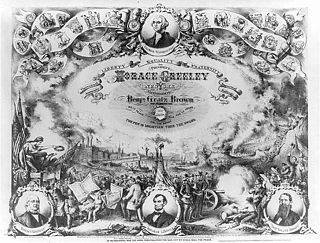
The Liberal Republican Party was an American political party that was organized in May 1872 to oppose the reelection of President Ulysses S. Grant and his Radical Republican supporters in the presidential election of 1872. The party emerged in Missouri under the leadership of Senator Carl Schurz and soon attracted other opponents of Grant; Liberal Republicans decried the scandals of the Grant administration and sought civil service reform. The party opposed Grant's Reconstruction policies, particularly the Enforcement Acts that destroyed the Ku Klux Klan. It lost in a landslide, and disappeared from the national stage after the 1872 election.

The 1860 Republican National Convention was a presidential nominating convention that met May 16–18 in Chicago, Illinois. It was held to nominate the Republican Party's candidates for president and vice president in the 1860 election. The convention selected former representative Abraham Lincoln of Illinois for president and Senator Hannibal Hamlin of Maine for vice president.
The ten percent plan, formally the Proclamation of Amnesty and Reconstruction, was a United States presidential proclamation issued on December 8, 1863, by United States President Abraham Lincoln, during the American Civil War. By this point in the war, the Union Army had pushed the Confederate Army out of several regions of the South, and some Confederate states were ready to have their governments rebuilt. Lincoln's plan established a process through which this postwar reconstruction could come about.

The Third Party System was a period in the history of political parties in the United States from the 1850s until the 1890s, which featured profound developments in issues of American nationalism, modernization, and race. This period, the later part of which is often termed the Gilded Age, is defined by its contrast with the eras of the Second Party System and the Fourth Party System.

The Republican Party, also known as the GOP, is one of the two major political parties in the United States. It is the second-oldest extant political party in the United States after its main political rival, the Democratic Party.
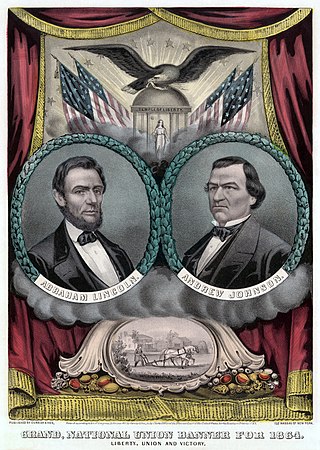
The National Union Party was the name used by the Republican Party and elements of other parties for the national ticket in the 1864 presidential election during the Civil War. Most state Republican parties did not change their name. The name was used to attract War Democrats, border state voters, and Unconditional Unionist, and Unionist Party members who might otherwise have not voted for Republicans. The National Union Party nominated incumbent Republican President Abraham Lincoln of Illinois and Democrat Andrew Johnson of Tennessee for Vice President. They won the Electoral College 212–21.

The Republican Party of Florida (RPOF) is the affiliate of the Republican Party in the U.S. state of Florida. Florida was dominated by the Democratic Party for most of its history. The Republican Party has rapidly gained ground in recent decades. It controls the majority of Florida's U.S. House seats, both U.S. Senate seats, the governorship, and has supermajorities in both houses of the state legislature.
The "Half-Breeds" were a political faction of the United States Republican Party in the late 19th century.

The presidency of Andrew Johnson began on April 15, 1865, when Andrew Johnson became President of the United States upon the assassination of President Abraham Lincoln, and ended on March 4, 1869. He had been Vice President of the United States for only six weeks when he succeeded to the presidency. The 17th United States president, Johnson was a member of the Democratic Party before the Civil War and had been Lincoln's 1864 running mate on the National Union ticket, which was supported by Republicans and War Democrats. Johnson took office as the Civil War came to a close, and his presidency was dominated by the aftermath of the war. As president, Johnson attempted to build his own party of Southerners and conservative Northerners, but he was unable to unite his supporters into a new party. Republican Ulysses S. Grant succeeded Johnson as president.

The lily-white movement was an anti-black political movement within the Republican Party in the United States in the late 19th and early 20th centuries. It was a response to the political and socioeconomic gains made by African-Americans following the Civil War and the Thirteenth Amendment to the Constitution, which eliminated slavery and involuntary servitude "except as punishment for a crime".
War Democrats in American politics of the 1860s were members of the Democratic Party who supported the Union and rejected the policies of the Copperheads. The War Democrats demanded a more aggressive policy toward the Confederacy and supported the policies of Republican President Abraham Lincoln when the American Civil War broke out a few months after his victory in the 1860 presidential election.
Conservative Republicans was a designation applied in reference to a faction of the early Republican Party during the American Civil War and Reconstruction era which advocated a lenient, conciliatory policy towards the South in contrast to the harsher attitudes emphasized by Radical Republicans. "Conservatives" such as Pennsylvania senator Edgar Cowan generally opposed efforts by Radical Republicans to rebuild the Southern U.S. under an economically mobile, free-market system.

"Radicalism" or "radical liberalism" was a political ideology in the 19th century United States aimed at increasing political and economic equality. The ideology was rooted in a belief in the power of the ordinary man, political equality, and the need to protect civil liberties.
References
- 1 2 The Radical Republicans. American Battlefield Trust. Retrieved February 5, 2022.
- 1 2 Foner, Eric (1988). Reconstruction: America's Unfinished Revolution, 1863–1877, pp. 241–47. New York: Harper & Row.
- ↑ John G. Sproat, "'Old Ideals' and 'New Realities' in the Gilded Age," Reviews in American History, Vol. 1, No. 4 (Dec. 1973), pp. 565–70.
- ↑ McPherson, James M. (December 1996). "Lincoln Speaks". The Atlantic. Retrieved February 5, 2022.